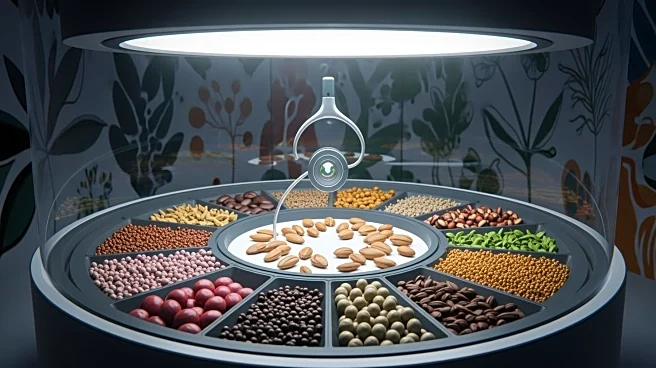What's Happening?
The Millennium Seed Bank at the Royal Botanic Gardens Kew in England is marking its 25th anniversary. The facility, which opened in 2000, stores over 2.5 billion seeds from around 40,000 species, preserved
at minus 20 degrees Celsius to prevent extinction. The seed bank is described as one of the most biodiverse places on Earth, serving as a secure archive of global flora. The seeds are collected from various countries and undergo a drying process to extend their lifespan before being stored. The bank has grown into a global partnership with 279 organizations in over 100 countries, supporting projects to reintroduce native species and restore habitats.
Why It's Important?
The Millennium Seed Bank plays a crucial role in preserving biodiversity, which is essential for protecting against disease, climate change, and other threats. As the global population is expected to increase by 2 billion by 2050, the need for genetic resources like those stored at Kew will grow, especially as new agricultural land becomes scarce. The seed bank's collections have supported efforts to restore damaged habitats and reintroduce native species, contributing to biodiversity conservation and climate change mitigation. The facility's work is vital insurance for global biodiversity, with nearly half of all flowering plants at risk of extinction.
What's Next?
The next 25 years for the Millennium Seed Bank will focus on using stored seeds to restore natural habitats and combat biodiversity loss and climate change. Kew has launched a £30 million Seeds Future Fund to support new research and partnerships worldwide. The facility aims to expand its conservation efforts and train more scientists in seed collection and storage, enhancing global conservation capacity. Researchers are also developing cryopreservation methods for tropical plants that cannot survive freezing, ensuring the preservation of diverse genetic resources.
Beyond the Headlines
The ethical and cultural dimensions of the Millennium Seed Bank's work are significant, as it represents a commitment to preserving the planet's biodiversity for future generations. The facility's efforts highlight the importance of international collaboration in addressing global environmental challenges. By conserving genetic diversity, the seed bank contributes to sustainable development and resilience against ecological threats, fostering a deeper understanding of the interconnectedness of ecosystems.










